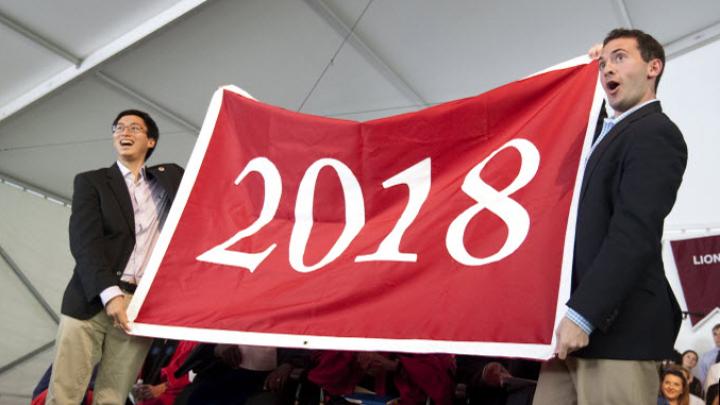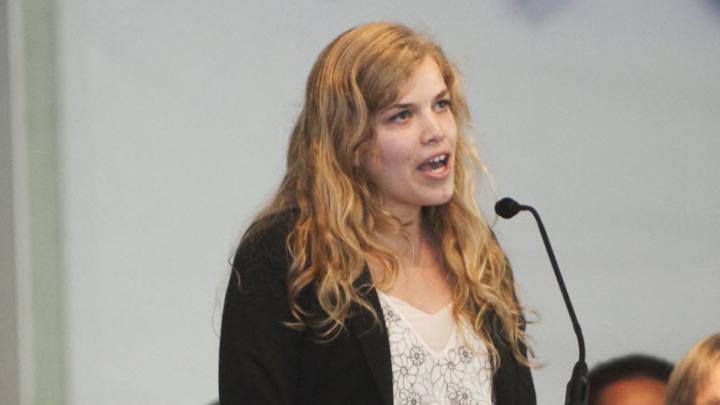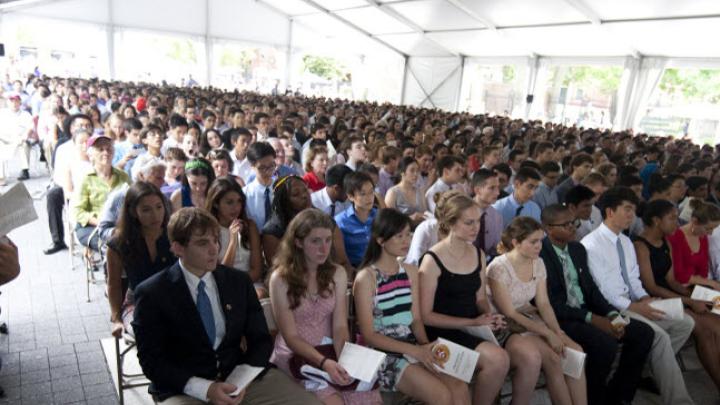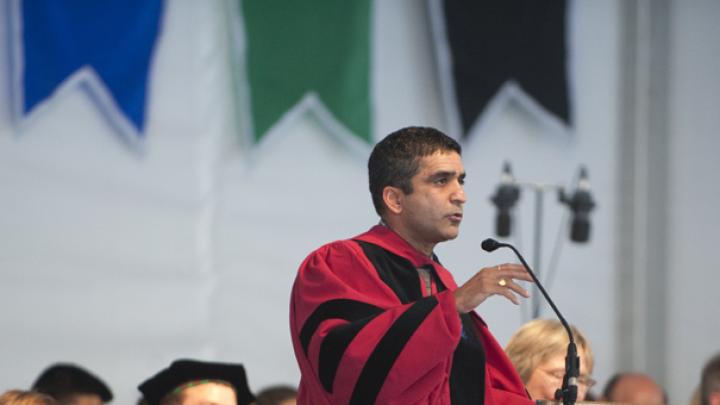At 2:15 Monday afternoon, this year’s freshmen thronged outside their dormitories, greeted by nearly 400 alumni marshals outfitted in lanyards and crimson baseball caps. The students shook hands with their elders. They each received, and donned, a class pin. Their arms stretched out to take selfies with their roommates, all dressed in their Labor Day best. Two people from each dormitory were charged with bearing its banner. When the bells of Memorial Church struck the hour, the students—teetering on heels, or restraining the urge to loosen their ties in the 88-degree heat—proceeded out the Yard gates to gather on Science Center Plaza for Freshman Convocation.
The ceremony was instituted in 2009 as a bookend to match the class’s final gathering at Commencement, adding more pomp and circumstance to students’ arrival at the College. For this tradition’s sixth year, the freshmen were cheered on by an assortment of upperclass advisers and student leaders. The Harvard University Band heralded them with “Fanfare for the Class of 2018,” composed by Annie Rak ’16 for the occasion.
Together with the alumni, faculty, administrators, and other guests, the first-years sheltered from the afternoon sun beneath the plaza’s broad white tent. To accommodate all the attendees, the Facilities Maintenance staff had added a twelfth section to the canopy, and set up 2,000 chairs in its shade. In previous years, the threat of rain had forced the gathering to be split between Sanders Theatre and Memorial Church. Katie Steele, director for freshman programming, said this year’s location was chosen with that possibility in mind: the class of 2018 would stay together, even in bad weather.
The opening remarks of this year’s ceremony emphasized history. Dean of freshmen Thomas A. Dingman took the audience through time, describing the experiences of the classes of 1718, 1818, and 1918. The Reverend Jonathan L. Walton, Plummer professor of Christian morals and Pusey minister in the Memorial Church, delivered an invocation that also pointed to Harvard’s earliest days: his choice of a Wampanoag prayer nodded to Harvard’s 1650 charter, providing for “the education of the English and Indian youth.” (Where Matthews Hall now stands in the Yard, the Indian College had been built in 1655 and dismantled in 1698, its bricks put to other uses.)
Other speakers emphasized the importance of being open to change and new experience. Calling himself a “freshman dean,” sociologist Rakesh Khurana, master of Cabot House and, as of July 1, dean of Harvard College, was self-deprecating, saying he shared the students’ anxiety as well as their excitement, and joking, “I’m 46 now and I still think medical school might be my possible next step if this whole deaning thing doesn’t work out.” But he also underlined the difference between what he called “transactional” versus “transformational” experiences in the intellectual, social, and personal realms. In a transactional experience, “you are reenacting the script that in many cases has worked for you up to this point,” Khurana said. Transformation, “the harder route,” was more challenging, but “If we are to tackle our most important challenges as a society—poverty, environmental degradation, justice, and health—a more transactional approach will not get us there.”
Michael D. Smith, dean of the Faculty of Arts and Sciences and Finley professor of engineering and applied sciences, repeated his advice from previous years: “Don’t compare, connect.” At Harvard, he said, “You are surrounded by the beautiful and powerful things that happen when we connect ideas and when we connect people.”
In her welcoming address, Eva Guidarini ’15, president of the student advisory committee at the Institute of Politics, also discussed the importance of relationships, and emphasized the need to deepen them. As a football fan—and Republican—from West Virginia, she said she had relied on boilerplate conversation-starters during her first fall at Harvard. In her eagerness to “find the first sentence of friendship” that would elicit a “me, too” response, Guidarini said that she had “missed the point” of the diverse Harvard community. She advised her audience to “Find the second sentences where you disagree, where your life experiences diverge, where your ideologies clash. Start to question, argue, debate, and ask ‘why,’ because that's where Harvard really gets exciting.” (At the end of her speech, first-year Kevin Wang, from Dallas, remarked to his neighbor, “It gives me hope if a Republican can be president of the Institute of Politics!” He later explained he’d been concerned by reports that Harvard’s diversity in other respects—including gender, race, ethnicity, socioeconomic status, and religious beliefs—did not necessarily extend to political ideology.)
University president Drew Faust chose discovery, and the unexpected, as her themes. In reviewing the dossiers of math faculty members proposed for tenure, she said, “A particular word repeatedly appears as the highest encomium for a young scholar. ‘This candidate's work is surprising.’” It was not only mathematicians who wanted to be surprised, she continued: “The great ballet master Diaghilev is said to have challenged his dancers: ‘Étonez-moi. Astonish me.’” Yet Faust cautioned students against “pleasing a Harvard version of Diaghilev.” Rather, she told them, “Take advantage of Harvard to surprise yourself.”
Faust concluded by telling the students, “You now are Harvard,” and reminding them of a sight that greeted them on move-in day, last week: lists of individuals who had occupied those same dormitories in years past. She noted that the very earliest names were those of white men, overwhelmingly Protestant, from old New England families, but also that the roster transforms over time. She said, “A year from now, a hundred years from now, newly arrived freshmen will sit where you're sitting and will have received lists with your names on them. They will wonder what you did here, what you loved about the place, where you made your mark, where you ended up.”
After Cynthia Torres ’80, M.B.A. ’84, president of the Harvard Alumni Association, presented the class banner and colors—this year, blue and white for Yale (see “Curious Colors,” from this magazine’s archives)—all stood up to sing “Fair Harvard.” Dingman’s closing thoughts were cut short, however, when a guest collapsed from heat exhaustion. The students were directed to the Widener steps for their class photograph, and an ambulance summoned. After the first-years had regrouped, Dingman gave everyone the good news that the guest was fine. Then he ran through the traditional recognition of the dorms, calling the names one by one as each group responded with a cheer.
The class of 2018 counts 1,667 members, 55.3 percent identifying as male, and 44.7 percent identifying as female. They come from 69 countries and all 50 of the United States of America, as well as the from the District of Columbia, Puerto Rico, Guam, and the Virgin Islands.
The next time they will gather as one, Faust said in her address, will be in Memorial Church, four years from now. “Until then,” she said, “Go well, Class of 2018.”
Updated September 3, 2014, at 2:45 p.m. to correct the College class year of HAA president Cynthia Torres.











